Set in contemporary Hong Kong, Dumplings is the story of Mrs. Li, a former TV star who is married to a man 15 years her senior. She’s 35 and he lost interest long ago in favor of his 20-something secretary/bimbo.
To regain her youth, Mrs. Li begins a regimen of eating dumplings — bite-sized, meat-filled, dough-covered — cooked by Aunt Mei, who appears to be in her early 30s. The dumplings are reputed to restore one’s youth, vigor and sexual attractiveness. Mrs. Li is at first repulsed by the lumps of dumps floating in broth, and we become so as well as hints begin to drop as to just what the meat in the concoction is. Aunt Mei — who, we discover, was 20 in 1960 — is a former nurse with a straight line to mainland China, where abortions are still performed in the thousands.
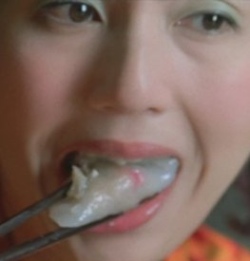 Written by Pik Wah Li (under the name Lillian Lee), who wrote the novel on which Farewell My Concubine was based, and directed by Fruit Chan, the film is — on the surface — about a power struggle between two women. Under the surface, it’s a biting revelation of how the rich, beautiful and powerful use the poor, pitiful and helpless. As Marie Antoinette said, “Let ‘em eat jiaozi.”
Written by Pik Wah Li (under the name Lillian Lee), who wrote the novel on which Farewell My Concubine was based, and directed by Fruit Chan, the film is — on the surface — about a power struggle between two women. Under the surface, it’s a biting revelation of how the rich, beautiful and powerful use the poor, pitiful and helpless. As Marie Antoinette said, “Let ‘em eat jiaozi.”
This one is as disturbing as any movie you’re likely to see unless you go so far underground even we won’t follow you. —Doug Bentin


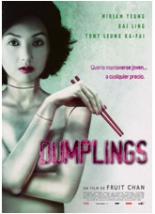
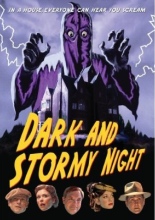
 Charles Ludlam, late founder of the Ridiculous Theatrical Company, once wrote a play the dialogue of which consisted of the punch lines of old jokes. No, I don’t remember the title. Jeez, do I have to do everything around here?
Charles Ludlam, late founder of the Ridiculous Theatrical Company, once wrote a play the dialogue of which consisted of the punch lines of old jokes. No, I don’t remember the title. Jeez, do I have to do everything around here? 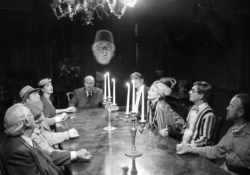 The relatives — and assorted strangers, servants and one guy in a gorilla suit — have gathered for the reading of the will, then they start dropping like lead bon mots. Blamire’s usual gang of thesps, with a quartet of guest actors who have been in movies you’ve actually heard of, deliver their senseless lines as if any of this had any meaning beyond tickling your nostalgia for Hollywood Poverty Row thrillers until it hollers, “Uncle!”
The relatives — and assorted strangers, servants and one guy in a gorilla suit — have gathered for the reading of the will, then they start dropping like lead bon mots. Blamire’s usual gang of thesps, with a quartet of guest actors who have been in movies you’ve actually heard of, deliver their senseless lines as if any of this had any meaning beyond tickling your nostalgia for Hollywood Poverty Row thrillers until it hollers, “Uncle!”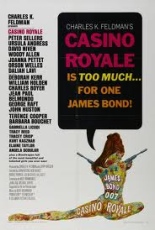
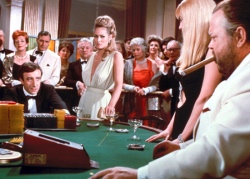 Hating each other, Welles and Sellers refused to be on set at the same time, so their scenes had to be shot separately and then welded together. It must have been pure hell. The enmity, at its core, seems to have been the result of people fawning over Welles and ignoring Sellers, who was finally fired before filming completed. He was replaced by a cardboard cutout.
Hating each other, Welles and Sellers refused to be on set at the same time, so their scenes had to be shot separately and then welded together. It must have been pure hell. The enmity, at its core, seems to have been the result of people fawning over Welles and ignoring Sellers, who was finally fired before filming completed. He was replaced by a cardboard cutout. Yes, Yankee Doodle in Berlin is silent, but don’t go away. Let me tell you about it. It’s different. Really.
Yes, Yankee Doodle in Berlin is silent, but don’t go away. Let me tell you about it. It’s different. Really.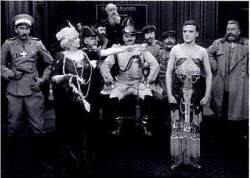 The comedy comes from shameless slapstick and the conceit that the Kaiser is nothing but a henpecked husband who is constantly under the thumb of his frau (Eva Thatcher). Add that to the propagandistic notion that Germany was being ruled by numbnuts and idiots (played by silent comedy stalwarts Ben Turpin, Chester Conklin, Bert Roach and others) and you have a fast-paced 58 minutes of funhouse slapstick that makes Mel Brooks look like Alan Rickman.
The comedy comes from shameless slapstick and the conceit that the Kaiser is nothing but a henpecked husband who is constantly under the thumb of his frau (Eva Thatcher). Add that to the propagandistic notion that Germany was being ruled by numbnuts and idiots (played by silent comedy stalwarts Ben Turpin, Chester Conklin, Bert Roach and others) and you have a fast-paced 58 minutes of funhouse slapstick that makes Mel Brooks look like Alan Rickman. 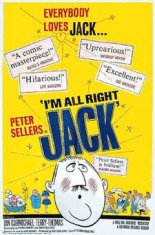
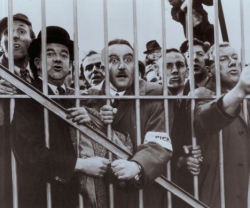 He gets a job as an efficiency expert working for his uncle whose company has landed a contract to build missiles for a Middle Eastern principality. Problem is, Uncle Bertie (Dennis Price) wants to lose the contract, which he underbid, so it will go to his nefarious pal Sidney De Vere Cox (Richard Attenborough), whose company will make a fortune to be split between the schemers.
He gets a job as an efficiency expert working for his uncle whose company has landed a contract to build missiles for a Middle Eastern principality. Problem is, Uncle Bertie (Dennis Price) wants to lose the contract, which he underbid, so it will go to his nefarious pal Sidney De Vere Cox (Richard Attenborough), whose company will make a fortune to be split between the schemers.